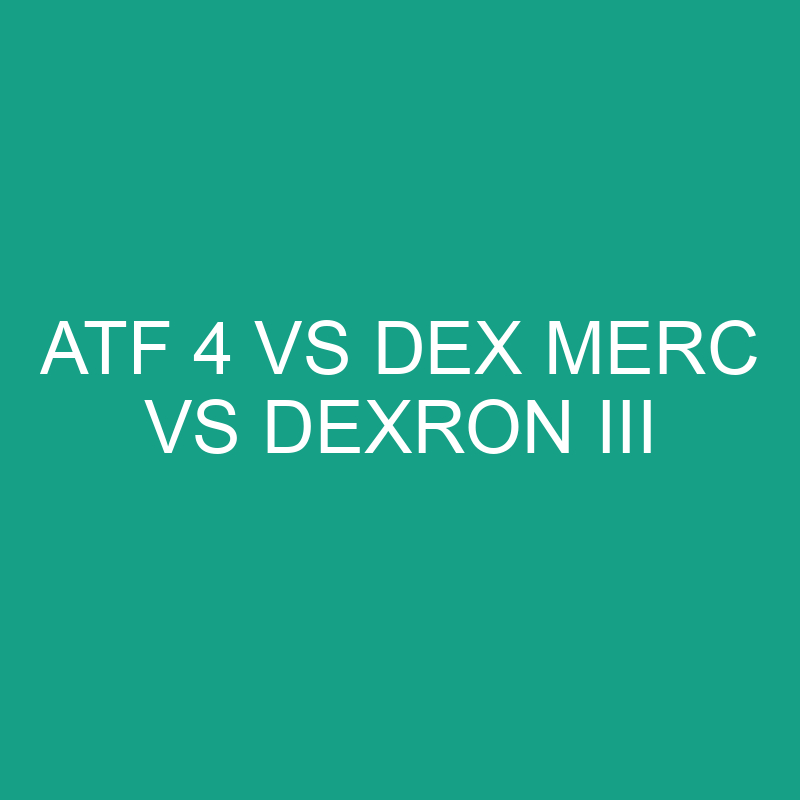
Navigating Automatic Transmission Fluids: Diving into ATF+4, Dexron Mercon, and Dexron III
Automatic Transmission Fluids (ATFs) are the unsung heroes of automatic transmissions, ensuring smooth gear shifts, cooling components, and protecting against wear. Among the myriad of ATF options, ATF+4, Dexron Mercon, and Dexron III stand out. In this comprehensive article, we embark on a journey to explore the nuances of these ATF types, delving into their formulations, compatibility, and the critical factors to consider when choosing the right ATF for your vehicle.
Post Contents
1. Introduction to Automatic Transmission Fluids:
1.1 Role of ATF:
ATFs serve multiple essential functions in an automatic transmission system:
- Lubrication: Reducing friction and preventing wear on moving parts.
- Heat Dissipation: Cooling transmission components.
- Sealing: Maintaining proper pressure and preventing leaks.
- Performance Enhancement: Facilitating smooth gear shifts and optimal transmission operation.
1.2 Viscosity and Specifications:
ATFs are characterized by viscosity and are formulated to meet specific performance standards set by vehicle manufacturers. The two primary specifications are Dexron (General Motors) and Mercon (Ford).
2. ATF+4:
2.1 Overview:
- Manufacturer: Mopar (Chrysler, Dodge, Jeep)
- Compatibility: Designed for Chrysler vehicles.
- Additive Technology: Advanced additives for enhanced performance.
2.2 Performance Characteristics:
- Friction Properties: Optimized for specific friction requirements in Chrysler transmissions.
- Oxidation Stability: Resistant to oxidation for extended fluid life.
- Compatibility: Specifically formulated for Chrysler, Dodge, and Jeep transmissions.
2.3 Applications:
- Chrysler Vehicles: Essential for modern Chrysler, Dodge, and Jeep transmissions.
- High-Performance Requirements: Suitable for high-stress conditions.
2.4 Advantages:
- Precision Formulation: Engineered for precise friction properties.
- Extended Fluid Life: Resistant to oxidation for prolonged use.
- Chrysler Approved: Ensures compatibility with Chrysler transmissions.
2.5 Considerations:
- Chrysler Vehicles: ATF+4 is a necessity for Chrysler transmissions.
- High-Performance Needs: Ideal for vehicles with demanding transmission requirements.
3. Dexron Mercon:
3.1 Overview:
- Compatibility: General Motors (Dexron) and Ford (Mercon).
- Additive Technology: Formulated to meet the specific requirements of both GM and Ford transmissions.
3.2 Performance Characteristics:
- Friction Properties: Balances friction requirements for both GM and Ford transmissions.
- Wear Protection: Provides excellent wear protection for transmission components.
- Wide Compatibility: Suitable for a range of vehicles requiring Dexron or Mercon specifications.
3.3 Applications:
- General Motors Vehicles: Compatible with transmissions requiring Dexron.
- Ford Vehicles: Compatible with transmissions requiring Mercon.
- Versatile Use: Suitable for vehicles with a variety of transmission specifications.
3.4 Advantages:
- Compatibility: Meets the specifications for both GM and Ford transmissions.
- Wear Protection: Provides excellent protection against wear.
- Versatile Use: Suitable for a wide range of vehicles with different transmission requirements.
3.5 Considerations:
- GM or Ford Vehicles: Dexron Mercon is a suitable choice for vehicles from both manufacturers.
- Mixed Fleet: Ideal for fleets with a variety of vehicles with different transmission specifications.
4. Dexron III:
4.1 Overview:
- Historical Significance: Dexron III is an earlier specification, with Dexron VI being the more recent version.
- Compatibility: General Motors (Dexron) standard.
4.2 Performance Characteristics:
- Friction Properties: Formulated to meet the friction requirements of GM transmissions.
- Oxidation Stability: Provides stability against oxidation for prolonged fluid life.
- Anti-Wear Properties: Offers protection against wear in transmission components.
4.3 Applications:
- GM Vehicles: Suitable for older General Motors vehicles that require Dexron III.
- Legacy Transmissions: Appropriate for transmissions where Dexron III is specified.
4.4 Advantages:
- Proven Performance: Dexron III has a long history of effective use in GM transmissions.
- Oxidation Resistance: Resistant to oxidation for extended fluid life.
- Cost-Effective Option: Typically more affordable than later Dexron specifications.
4.5 Considerations:
- Compatibility: Dexron III is suitable for older GM vehicles requiring this specification.
- Cost Considerations: A cost-effective choice for vehicles that do not demand the latest specifications.
5. Comparative Analysis: ATF+4 vs. Dexron Mercon vs. Dexron III
5.1 Manufacturer and Compatibility:
- ATF+4: Manufactured by Mopar for Chrysler vehicles.
- Dexron Mercon: Compatible with both GM and Ford vehicles.
- Dexron III: A historical GM specification.
5.2 Additive Technology:
- ATF+4: Advanced additives for precision in Chrysler transmissions.
- Dexron Mercon: Balanced formulation for GM and Ford transmissions.
- Dexron III: Older formulation with proven performance.
5.3 Performance Characteristics:
- ATF+4: Precision formulation for specific friction properties.
- Dexron Mercon: Balances friction and wear protection for mixed fleet use.
- Dexron III: Proven wear protection and oxidation resistance.
5.4 Applications:
- ATF+4: Exclusive to Chrysler, Dodge, and Jeep transmissions.
- Dexron Mercon: Versatile use for both GM and Ford transmissions.
- Dexron III: Suitable for older GM vehicles requiring this specification.
5.5 Advantages:
- ATF+4: Precision for Chrysler transmissions, extended fluid life.
- Dexron Mercon: Compatibility with both GM and Ford transmissions, excellent wear protection.
- Dexron III: Proven performance, cost-effective choice for older vehicles.
5.6 Considerations:
- ATF+4: Essential for Chrysler vehicles with high-performance demands.
- Dexron Mercon: Ideal for fleets with a mix of GM and Ford vehicles.
- Dexron III: Suitable for older GM vehicles with cost considerations.
6. Choosing the Right ATF for Your Vehicle:
6.1 Vehicle Specifications:
- Refer to the Manual: Always check the vehicle manual for the recommended ATF specifications.
6.2 Transmission Type:
- Chrysler Vehicles: ATF+4 is necessary for Chrysler transmissions.
- Mixed Fleet: Dexron Mercon is ideal for fleets with a variety of vehicles.
6.3 Performance Requirements:
- High-Performance Needs: ATF+4 for Chrysler vehicles with demanding transmission requirements.
- Balanced Performance: Dexron Mercon for vehicles with a mix of GM and Ford transmissions.
- Proven Performance: Dexron III for older GM vehicles with standard performance needs.
6.4 Cost Considerations:
- Cost-Effective Option: Dexron III is typically more affordable for older vehicles.
- Performance Priority: ATF+4 and Dexron Mercon for vehicles where performance is a priority.
7. Conclusion:
Selecting the right ATF among ATF+4, Dexron Mercon, and Dexron III is contingent on a meticulous consideration of your vehicle’s specifications, the type of transmission it employs, and your performance expectations. Whether you opt for the precision formulation of ATF+4 for Chrysler vehicles, the versatile use of Dexron Mercon for mixed fleets, or the proven performance and cost-effectiveness of Dexron III for older GM vehicles, understanding your transmission’s needs will guide you toward the optimal choice. Regular ATF changes using the appropriate ATF for your vehicle are integral to ensuring its longevity and optimal performance. Always refer to your vehicle manual and consult with automotive professionals if needed to ensure the chosen ATF aligns with your vehicle’s transmission requirements.






